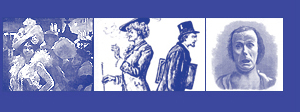Criminality
Author :
Title : Punch responds to the ‘outbreak’ of garrotting (1862)
Keywords: Punch. Cartoon. Garrotting Panic. Prison. Jebb.
Introduction
The Garrotting Panic of 1862 is now seen as a classic example of a ‘moral panic’, that is, a hyperbolic reaction to a perceived but evidentially baseless increase in criminality. It was sparked initially by the mugging and choking of Hugh Pilkington, M.P. on 17 July 1862. This quite minor incident became the focus of a considerable amount of public anxiety, whipped up by newspapers such as the Sun, The Times, and the Observer, and periodicals such as Punch, and the Saturday Review about the end of transportation to Australia and the activities of ticket-of-leave men (offenders released on a provisional licence), as well as the apparent ineffectiveness of reform programmes for criminals. The idea of a dangerous criminal class preying on respectable society, became increasingly popular during the panic. Legislative measures were taken quickly to reduce that perceived threat. In 1863 Parliament passed the Garrotters Act, which reintroduced corporal punishment for armed or violent robbery, and in 1864 the Penal Servitude Act, which made mandatory the police supervision of ticket-of-leave men, and increased the length of penal servitude. Sir Joshua Jebb (d. 1863), the Director of Convict Prisons at the time of the panic, came in for much criticism for the apparent softness of his penal regime.
Back to Documents | Introduction | page 1 | page 2 | page 3

